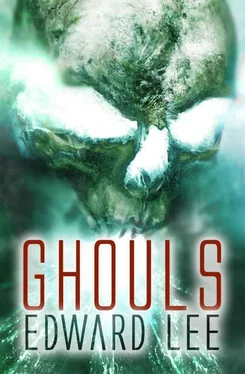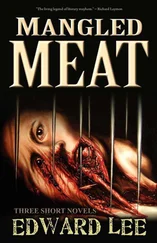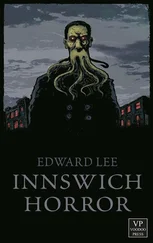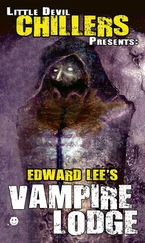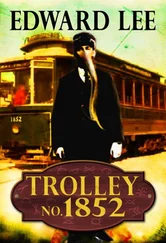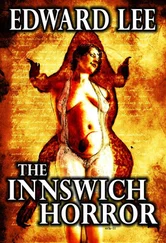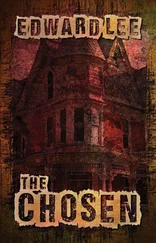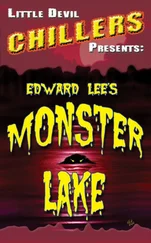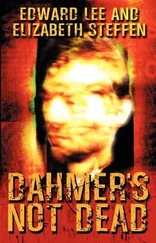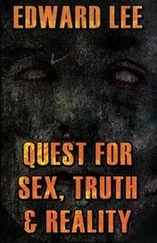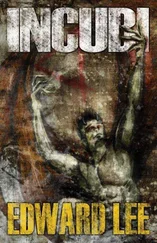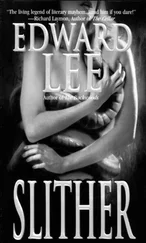Kurt let out a slow breath. He thought he was beginning to understand. “Like pushing a penny into clay and getting the date, but not a trace of Lincoln’s face.”
“Exactly.”
“Isn’t there anything you can do with just the pore patterns?”
“No. Not in this situation anyway. As a rule, pore schemes are used to link good ridge patterns with bad. By themselves, they’re almost never admissible in court—you can run fingerprints, but you can’t run pore patterns. Without any suspects, these things are useless.”
Neither of them spoke for a time, but when their silence became edgy, she punched the slide button again. She seemed to be squeezing the brush handle as hard as she could. “Here’s another dust job with anthracene. I upped the UV to 380 nanometers, to make it pretty.”
Kurt’s face screwed up in confusion. The screen captured a bright, glowing blue outline against a flat gray background, like a phosphorescent inkblot of a man with one arm and no head.
“How do you like it?” she asked. Her face was beaming now in the fragmented darkness. She brought the tip of the brush handle to her mouth and bit down, delighted at Kurt’s bewilderment.
“What is it?”
“A palm print,” she said. “I found six complete palm prints on the coffin. I treated and photographed two of them. Here’s the second one.” The comparator churned and spat the last slide into the slot. Now the screen held a similar outline, but with reversed polarity.
Kurt stared at her. It couldn’t be what he was thinking. “Tell me,” he said.
“The first slide was a right hand, the second a left. You know what that means, don’t you?”
“Only three fingers on each hand?”
“Uh huh. And if that’s not balled up enough, consider the physical measurements. The average handspread of an adult Caucasian male, that is minimus to opposable thumb, is roughly nine and a half inches. The same measurement on this print is over twelve.”
Kurt looked at his own hand and tried to envision the difference. He gulped.
“Which means,” she went on, “that this person is big, real big.”
Kurt’s eyes darted from her to the screen, then back to her again. “But this is crazy.”
“And there’s no way that an accident can account for the missing fingers on each hand. The palmer outlines are too natural, the spaces between the metacarpals too wide, too even. It’s got to be some kind of birth defect or something.” She jammed the brush into the hole of a test-tube rack, and left it there. “I’m going to send some of this stuff to the bureau, see what they say about it. Count on a six-week wait. In the meantime…” She extended a white, tiny hand to the screen.
Kurt stared at the illumined, blue image. It seemed to waver in space, as if three dimensional. “At least I got a good lead.”
“Yeah, knock yourself out. How hard can it be to spot a guy with three fingers on each hand and a notable case of acromegaly?” Laughter fluttered up between Jan Beck’s words. “It’s either that, or spacemen have landed in Tylersville.”
««—»»
Bard seemed to have grown into his office chair; its confines were filled by the sheer girth of his body, his buttocks and belly handles settling there like a big bag of mud. Kurt thought if the chief didn’t get out of that chair soon, he’d have to have it surgically removed. It was no wonder the man had a bad heart and blood pressure high enough to spin a turbine.
Seated, Kurt faced him. He reached shakily for a cigarette and almost broke it getting it out of the pack. All the while Bard’s face filled with hot blood as he scanned the forensic findings from Pikesville. Severe dissatisfaction raised a nearly palpable blockade across the desk, and with excruciating slowness, Bard’s eyes tracked up from the report and found Kurt’s, like a pair of ice picks.
“What is this shit you bring me?”
Kurt shrugged, trying to pretend nonchalance. He felt strangely as though the evidence findings were his fault, much the same as the aide must’ve felt who had waked Hitler to tell him that Europe was being invaded. Kurt pointed his finger like a gun. “Don’t blame me, boss. You told me to pick up the evidence report, so that’s what I did.”
“This isn’t an evidence report.” Bard wagged the sheaf of papers vigorously in the air. “This is science fiction; it’s worse than the one from the county. I can’t do anything with this except wrap fish. These people were supposed to give us a set of professional, scientific conclusions, from which we can take proper investigative action. Instead they give us shit.”
“I wouldn’t call it shit,” Kurt dared to say. “Her conclusions are pretty clear under the circumstances, with a great lead. We shouldn’t have a whole lot of trouble finding a guy with acromegaly.”
Bard’s face creased, an image of slits in clay. “What the fuck is that?”
“Some kind of pituitary disease. Makes you grow more than you’re supposed to. Real tall, real long bones, big face. Like that guy Lurch on the Addams Family. ”
Bard rubbed his face and let out a pained chuckle. “Jesus, I knew I should’ve stayed in the pool-cleaning business. I got a dug-up coffin, a missing officer, an abducted crippled girl, and if that’s not enough, now I got a guy who looks like fucking Lurch on the Addams Family.”
Kurt stood up quickly, struggling to remove his car keys. He sensed the approach of one of Bard’s outbursts; he didn’t want to be around when it happened. “Time for me to book, Chief. I might as well earn my pay, even though I’m not getting any.”
“What are you gonna do?”
“Start looking for Lurch. What else?”
««—»»
Kurt drove north on 154. He didn’t put much stock in the “Lurch” angle, but any lead was better than none; giants with three fingers on each hand weren’t easily forgotten, though in this town who could tell? It was something to ask around about, and he decided he’d start asking at the first logical place.
All but one of Belleau Wood’s chain gates was open. Kurt entered cautiously, puzzled that a millionaire couldn’t provide a smoother access to his own house. This particular road led straight into the forest. Bloodroot blossoms and Queen Anne’s lace bowed aside from the brush. As he passed, animals watched from safe distances, then meandered away, uninterested. The woods seemed to compress as he went on. It made him feel strange, it made him feel alone (but he knew he was alone) and still there was something threatening and utterly present about the forest’s depth. The dark day, perhaps, or the silence. If something happened to him (Something. What?) it might be hours or even days before he’d be found. (Found? Found. Like Drucker. Like Swaggert. “Chief Bard? Yeah, this is Glen. I just found Kurt.”) His hands tightened on the wheel. Against his will he glanced inadvertently into the rearview. Ahead of him he swore he could see shapes peering back from between the trees, configurations suspiciously human, and when he strained to focus his eyes they were gone. It was easy now to perceive the forest as something more than that. It was a maze of shadows and brooding light and paths which twisted away into nowhere. This was not a forest, but an interstice where men were not wanted, a hunting ground for ghosts.
He sighed at his own self-conscious reflections. His grip loosened on the wheel, and he relaxed. Daylight broke on his face. While he’d been busy speculating the woods and the horrors of the mind’s eye, the road had led him out.
He saw now how nature had made a fortress of Belleau Wood. Hills broke within the dense, surrounding forest, and through the center a cramped, almost perfectly square clearing sloped unevenly to the east. The property past the tree belt glowed in the light as a spread of thickets and waist-tall rye. At the summit of the fattest hill, the mansion could be seen.
Читать дальше
